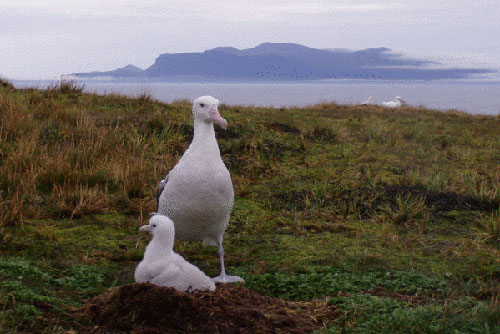It is well-known that most seabird species breeding at sub-Antarctic islands are confiding and allow of close approach without seemingly causing excessive disturbance. Among the ACAP-listed species of surface-nesting albatrosses and petrels it appears it is only the Southern Giant Petrel Macronectes giganteus (and not at all its breeding colonies) that is the notable exception to this general observation.
Yet lack of, for example, a flight response, does not necessarily mean that disturbance of breeding southern albatrosses is not harmful to them in some way, perhaps by a reduction in breeding success, or in the long term, affecting recruitment to an often-visited locality. An example of the latter is where the numbers of Wandering Albatrosses Diomedea exulans breeding in close proximity to a weather station have dropped over a fifty-year period (click here).

As part of her research towards a PhD, recently awarded by the University of Cape Town, Mariëtte Wheeler and colleagues studied the effects of different types of pedestrian approaches on the behaviour of breeding Wandering Albatrosses at South Africa's Marion Island in the southern Indian Ocean. The study showed that frequency of approach did not influence short-term behavioural responses, but did affect chick survival.
These findings are of relevance when both drawing up regulations for shore-based tourism and guidelines for the conducting of research on islands where Wanderers breed.
Reference:
Wheeler, M., de Villiers, M.S. & Majiedt, P.A. 2009. The effect of frequency and nature of pedestrian approaches on the behaviour of Wandering Albatrosses at sub-Antarctic Marion Island. Polar Biology 32: 197-205. http://www.springerlink.com/content/55103278441p7658/fulltext.pdf?page=1
John Cooper, ACAP Information Officer, 3 January 2010

 English
English  Français
Français  Español
Español